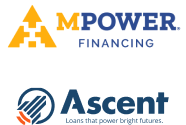
Happy Money vs Upgrade
Comparisons
Happy Money

.svg)
Who is it for?
Happy Money is ideal for individuals focused on consolidating and paying off credit card debt. It's particularly beneficial for those with fair to good credit scores and looking for a structured way to manage their debt. It's particularly suitable for borrowers committed to improving their financial health and searching for tools and resources to aid in this journey.
APR
The APR for Happy Money loans ranges from 11.72 to 17.99%. This rate is determined by factors such as the borrower's credit score and income, the total amount borrowed, and the loan's term length.
Loan/Line of Credit
This is a flexible borrowing option in which a lender approves a certain amount of credit, but you only borrow what you need.
Loan Term
Loan terms are flexible, ranging from 24 months (2 years) to 60 months (5 years).
Rewards & Fees
Origination Fee: Ranges from 0.00% to 5.00%, based on credit score and application. No early payoff penalties or late fees. Rewards in the form of credit score improvement tools and financial management resources.
How to Qualify?
Qualifying for a Happy Money loan involves a few key steps. Firstly, applicants should have a credit score of 640 or higher, which is a primary criterion for eligibility. The loan application process includes a soft credit inquiry, which allows Happy Money to assess the applicant's creditworthiness without impacting their credit score. This inquiry determines the applicant's eligibility for a loan and the specific terms that can be offered.
Upgrade

.svg)
Who is it for?
Upgrade personal loans are a practical choice for borrowers with fair to excellent credit who need smaller, more manageable loans. They range from $1,000 to $50,000 and cater to those who might not qualify for larger loans. With a minimum credit score requirement of 560, Upgrade provides an accessible option for many borrowers. This flexibility makes it ideal for various financial needs, including debt consolidation and home improvements, especially for those seeking loans with less stringent credit criteria.
APR
Upgrade's loans feature an APR range of 8.49% to 35.99%, borrowers with excellent credit can access the lower end of this range, benefiting from competitive rates that make these loans financially attractive.
Loan/Line of Credit
Upgrade offers personal loans ranging from $1,000 to $50,000, catering to a broad spectrum of borrowing needs. Whether it's for consolidating debt, funding a home improvement project, or covering unexpected expenses, these loans provide financial flexibility.
Loan Term
The loan terms are equally accommodating, with 24 to 84 months durations. This range allows borrowers to tailor their repayment schedule to their financial situation, balancing monthly payments with the loan duration. The extended-term options benefit those who prefer lower monthly payments over a more extended period, making financial planning more manageable.
Rewards & Fees
Upgrade allows borrowers to modify payment dates to align more effectively with their finances.
How to Qualify?
To qualify for an Upgrade personal loan, applicants must be U.S. citizens or permanent residents living in the U.S. on a valid visa. They must be at least 18 years old (age may vary by state) and have a verifiable bank account and valid email address.
Common Terms to Know
Understanding certain key terms is essential when evaluating debt consolidation loans
- APR (Annual Percentage Rate): This is the annual rate charged for borrowing and includes both the interest rate and any additional fees.
- Origination Fee: A fee charged by some lenders to cover the cost of processing the loan.
- Debt-to-Income Ratio (DTI): This ratio compares your monthly existing debt payments to your monthly gross income.
- Credit Utilization: The amount of credit you are using compared to your total available credit.
- Fixed vs. Variable Interest Rates: Fixed rates remain the same throughout the loan term, while variable rates can fluctuate.
How to Compare Loans
When comparing debt consolidation loans, consider the following factors
- Interest Rates and APR: Look for the most favorable rates that will determine your monthly payments and the total cost of the loan.
- Fees: Be aware of any origination fees, late fees, or prepayment penalties.
- Loan Terms: Shorter loan terms usually mean higher monthly payments but lower overall interest, while longer terms spread out the payments but increase the total interest paid.
- Loan Amounts: Ensure the lender can provide the amount you need to consolidate your debts.
- Eligibility Requirements: Check the minimum credit score and income requirements.
Before You Take a Loan
Before applying for a debt consolidation loan, it's important to
- Understand your total debt, monthly income, and expenses.
- Check your credit score. This will give you an idea of which loans you may qualify for.
- Consider the total cost of the loan, including interest and fees, over its lifetime.
- Ensure that the monthly payments fit comfortably in your budget.
How To Get A Debt Consolidation Loan
- Your credit score will significantly impact your eligibility and the terms you'll be offered. Start by obtaining your credit report and score to understand your current standing.
- Research various lenders, comparing their APRs, fees, terms, and eligibility criteria. Utilize online comparison tools to streamline this process.
- Carefully read the fine print to grasp all the loan terms, including the repayment terms, fees, and any penalties.
- After selecting the best loan for your needs, complete the application process. This may involve providing financial documents and undergoing a credit check.
- Some lenders offer pre-approval processes, allowing you to gauge the potential terms without affecting your credit score.
FAQ's

.svg)

.svg)
.svg)
.svg)
.png)


.svg)
.svg)